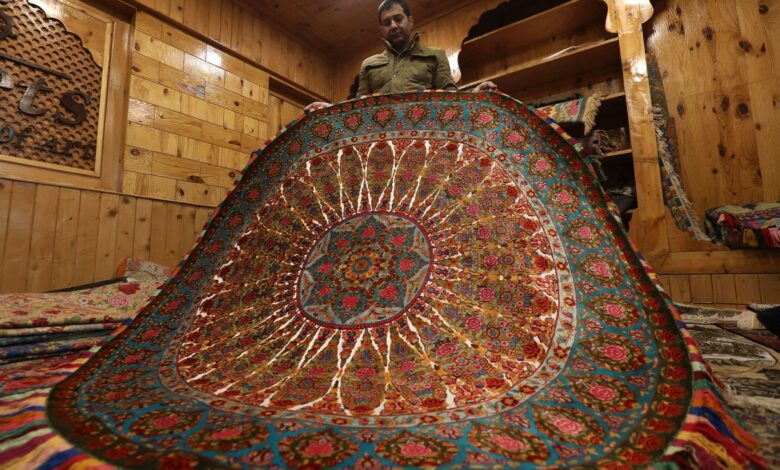Famed Kashmiri carpets to get QR-code based authentication

By Shah Abbas
Srinagar, India, Feb 16 (EFE).- Authorities in Indian-administered Kashmir have launched a QR Code based mechanism for the certification and labeling of handmade carpets of the region, which are famous across the world for their rare craftsmanship and quality.
According to government officials, the QR-code system – based on a scannable barcode that can be easily read by digital devices such as smartphones – is the first of its kind in India and will assure customers of getting authentic Kashmiri carpets and not being cheated by fake but similar material.
“With the help of modern technology, we will be able to standardize the uniqueness of handmade carpets and boost exports of Kashmir’s carpet industry in the international market,” an official at the handicrafts and handloom department told EFE.
Primarily made in the vicinity of Srinagar, the largest city, and other rural parts of Kashmir, the famous rugs are extraordinary artworks sought across the world.
The carpet Industry has played a key role in the economic activities of the disputed region and the products form a sizable part of exports from the handicrafts and handloom sector, in which Kashmir has established a unique identity,
“Presently, carpets from Kashmir are being exported to at least 25 countries,” a government statement said last week, adding that in the financial year 2020-21, rugs worth 1.15 billion rupees ($15 million) were exported to Germany.
Other major export destinations include the United Arab Emirates (360 million rupees), the United States (340 million) and the Netherlands (220 million).
Ghulam Hassan, a Kashmir carpet trader, traces the history of these carpets to the 15th century.
“It is said that Kashmir’s 15th century ruler, Sultan Zain-ul-Abedin, brought carpet weavers from Persia (Iran) and central Asia to Kashmir to train the local inhabitants,” Ghulam Hassan told EFE.
Another carpet trader of Srinagar’s Chattabal area, Subhan Chaat, said that Kashmiri carpets were hand-weaved with 200-900 knots per square inch (6.5 sq cms) both in wool and silk yarn, and are ranked amongst the finest in the world.
However, the carpet makers and traders have long complained of issues such as lack of investment from the private sector, shallow markets, poor infrastructure, and most importantly the ongoing political conflict in the region, which have brought the industry to the brink of extinction.
The youth of the region are not showing much interest in continuing the carpet-weaving tradition.
The handicrafts and handloom department claims that it is taking measures to attract more people towards the industry.
“Government has introduced a scheme under which, an incentive of 10 percent of the total volume of the certified handicrafts and handloom products exported to any country, with maximum reimbursement up to 50 million rupees, shall be provided to eligible exporters registered with the department”, an official statement said.
The department, along with the Srinagar-based Indian Institute of Carpet Technology, has decided to launch a “massive awareness and promotional campaign” to popularize hand-knotted Kashmiri carpets around the world, the statement added.
“The IICT has also taken several important steps for GI (Geographical Indication) certification, testing, labeling and training to promote Kashmiri carpets,” it said.
The economy of India’s only Muslim majority region has been shambles from 1989, the year that saw the onset of an armed separatist rebellion, with New Delhi alleging Islamabad of backing the rebels, although the latter denies the accusation.
The region was stripped of its semi-autonomous status by India in August 2019 and divided into two federally administered regions, triggering more unrest, with subsequent communication blockades enforced by authorities further damaging local trade and economy. EFE
sa/ia





